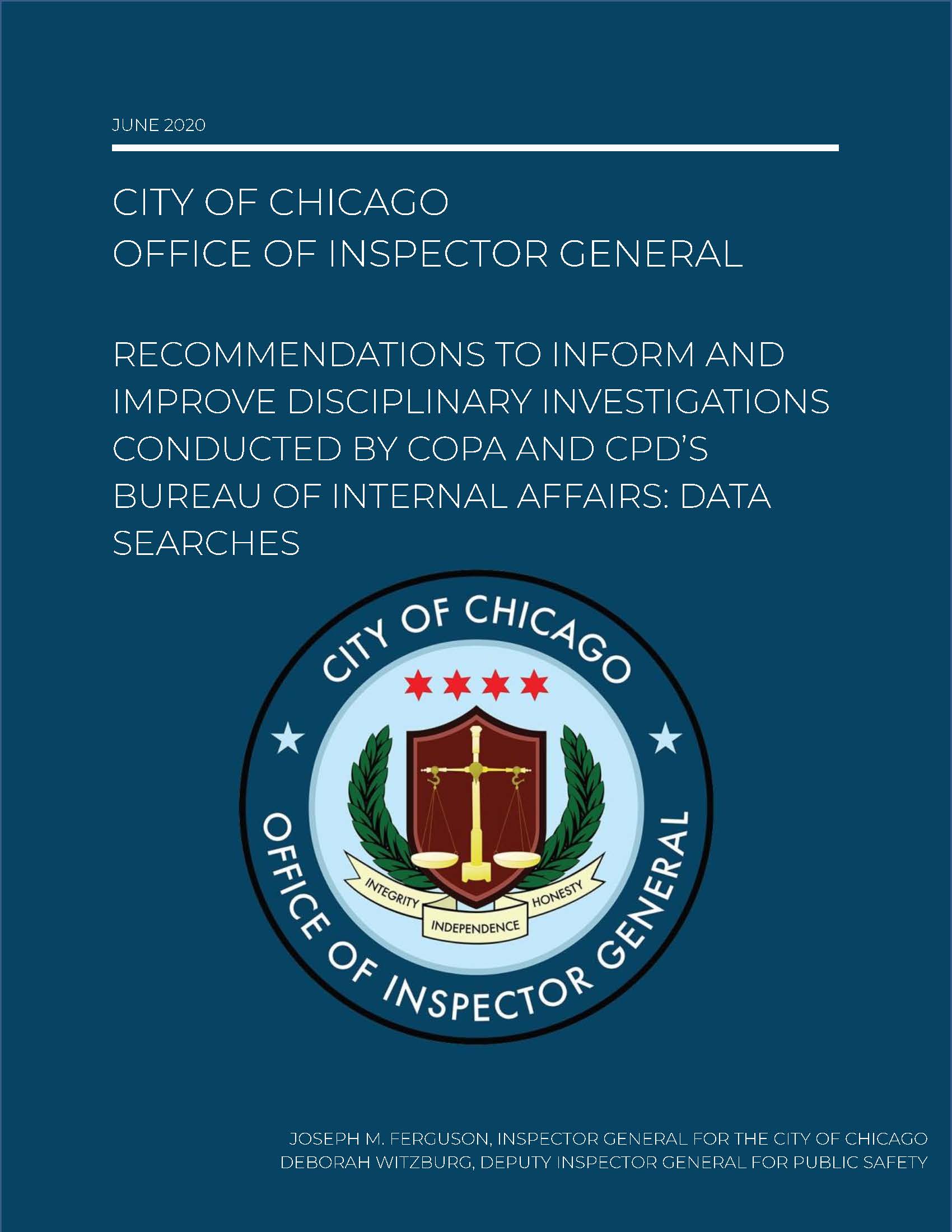Recommendations to Inform and Improve COPA and BIA Disciplinary Investigations
Summary
In the course of its regular review of closed disciplinary investigations, OIG identified recurring errors and inaccuracies in data warehouse queries and records searches, including but not limited to misspelled names; incorrect addresses, dates, times, and date ranges; unduly narrow time, date, and address ranges; omission of key search terms, and incomplete records searches.
Executive Summary
Pursuant to the Municipal Code of Chicago§ 2-56-230(c), the Public Safety section of the City of Chicago Office of Inspector General (OIG) conducts, on an ongoing basis, reviews of individual closed disciplinary investigations conducted by the Civilian Office of Police Accountability (COPA) and the Chicago Police Department’s (CPD) Bureau of Internal Affairs (BIA). OIG is charged with the duty to make recommendations based on those reviews to inform and improve future disciplinary investigations, and to ensure that they are complete, thorough, objective, and fair.
COPA and BIA are charged with investigating, documenting, and reviewing allegations of misconduct by CPD members. COPA investigates allegations including, but not limited to, bias-based verbal abuse, domestic violence, excessive force, improper search and seizure, and firearm discharge. BIA investigates allegations including, but not limited to, criminal misconduct, operational violations, planning of drugs, residency violations, and medical roll abuse.
In the course of its regular review of closed disciplinary investigations, OIG identified recurring errors and inaccuracies in data warehouse queries and records searches, including but not limited to misspelled names; incorrect addresses, dates, times, and date ranges; unduly narrow time, date, and address ranges; omission of key search terms, and incomplete records searches. These errors were observed in multiple investigations conducted by both BIA and COPA.
To foster trust and confidence in Chicago’s police accountability system, it is imperative that COPA and BIA’s investigations are thorough and well-documented in order to ensure transparency and consistency. To that end, OIG has recommended that COPA and BIA undertake the following:
1. Incorporate guidance on conducting data warehouse queries and records searches into onboarding and in-service trainings for investigators, instruction manuals, and investigative procedure policies. The training and policies should include concepts such as using wildcard search terms whenever possible and expanding search parameters, such as date or address ranges, if an initial search returns negative resuIts.
2. Require investigators to list search terms and parameters used in data warehouse queries and records searches in their closing document when a negative search result is a critical factor in reaching an investigatory disposition. Investigators preparing their closing documents, and supervisors approving those documents, should confirm that the information entered for queries and searches matches the correct spelling of names and addresses, that date and address ranges are correct and sufficiently broad, and that all available information was used in the query or search.
CPD agreed that improved training and protocols will help minimize the errors identified by OIG, and confirmed that BIA is in the process of revising its training and will incorporate OIG’s training recommendations. CPD stated it would consider OIG’s recommendation that investigators record the specific details of their searches.
COPA maintained that the use of expansive search terms is already COPA policy, but assured OIG that it would refresh its training on this issue. COPA also indicated it would explore options for a technology-based application to allow the creation and reproduction of search lists for the purpose of supervisory review.
The Public Safety section’s letter to COPA and CPD containing its recommendations is attached in Appendix A. COPA and CPD’s response letters are attached in Appendices Band C, respectively.
The data search errors identified by OIG may result in significant adverse consequences, by preventing disciplinary investigations to reach appropriate and fair outcomes. OIG encourages CPD and COPA to implement these responsive measures in the interest of assuring a professional standard of care, and thanks COPA and CPD management and staff for their ongoing cooperation in OIG’s review of closed disciplinary cases.
Subscribe to the OIG Bulletin to get notified about future publications.

